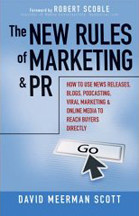Right now, I’m on a plane headed toward Reno to attend a state commission meeting in Incline Village. So I wrote this last night and asked my partner to post it this morning (rather than double up on Thursday and be dead on Friday).
The Internet makes it possible: you can post a piece of the past in the present and nobody knows it, unless you tell them. I found it fitting to mention because this is an odd little post about the collective unconscious, which was Carl Jung’s theory that we can all pull something down from “a reservoir of the experience of our species.”
It happens in my field every now and again. Someone comes up with an advertising campaign at virtually the same time someone else does, leaving some of them to wonder who came up with the idea first. Maybe no one did. It happens on blogs as well. Sometimes two authors write about virtually the same thing even though the inspiration is unrelated. It happened with David Maister and Seth Godin this week.
Maister posted about Passion, People and Principles, which is not only the title of his blog, but also three ingredients that make up a recipe for success.
Passion alone, he rightfully points out, can be dangerous. You’ll seduce a lot of people to your side, but you’ll end up fooling or betraying them. If you have principles and understand people, you risk being righteous but ineffective. You need all three in everything, which is so right, almost no one could add anything to the proposed discussion.
The day before, Godin posted a similar point, talking about drive, which is another way of saying passion.
He’s right too. Most successful organizations are driven by something, for a while anyway (not all drives are sustainable, largely because they neglect the other two ingredients). He then runs down a list of drives associated with some companies (eg. paycheck driven, marketing driven, fashion driven, etc.).
Market driven, which he says most people claim to be but really aren’t, is about creating what the market wants. It seems to me that of all the drives that he lists, market driven is most likely to carry the passion, people, and principles equation. Maybe that’s why it is first on the list.
I always understood, but never really cared for Jung. Still, he laid some important groundwork for other psychologists and theorists, especially in terms of identifying behavioral patterns, dream interpretation, and, yep, the collective unconscious.
Hmmm … I wonder how many times Jung’s name came up in the news during the last month and if that’s why I reached up and pulled down collective unconscious after seeing a coincidental link between two blogs. It’s not the first time; and likely won’t be the last.
Regardless, there is a collective truth to what Maister and Godin offered up. And me, well, I’m content to make my way as a beneficial presence. Maybe you can figure out where that might fit within two contexts. I think it fits quite nicely.

The Internet makes it possible: you can post a piece of the past in the present and nobody knows it, unless you tell them. I found it fitting to mention because this is an odd little post about the collective unconscious, which was Carl Jung’s theory that we can all pull something down from “a reservoir of the experience of our species.”
It happens in my field every now and again. Someone comes up with an advertising campaign at virtually the same time someone else does, leaving some of them to wonder who came up with the idea first. Maybe no one did. It happens on blogs as well. Sometimes two authors write about virtually the same thing even though the inspiration is unrelated. It happened with David Maister and Seth Godin this week.
Maister posted about Passion, People and Principles, which is not only the title of his blog, but also three ingredients that make up a recipe for success.
Passion alone, he rightfully points out, can be dangerous. You’ll seduce a lot of people to your side, but you’ll end up fooling or betraying them. If you have principles and understand people, you risk being righteous but ineffective. You need all three in everything, which is so right, almost no one could add anything to the proposed discussion.
The day before, Godin posted a similar point, talking about drive, which is another way of saying passion.
He’s right too. Most successful organizations are driven by something, for a while anyway (not all drives are sustainable, largely because they neglect the other two ingredients). He then runs down a list of drives associated with some companies (eg. paycheck driven, marketing driven, fashion driven, etc.).
Market driven, which he says most people claim to be but really aren’t, is about creating what the market wants. It seems to me that of all the drives that he lists, market driven is most likely to carry the passion, people, and principles equation. Maybe that’s why it is first on the list.
I always understood, but never really cared for Jung. Still, he laid some important groundwork for other psychologists and theorists, especially in terms of identifying behavioral patterns, dream interpretation, and, yep, the collective unconscious.
Hmmm … I wonder how many times Jung’s name came up in the news during the last month and if that’s why I reached up and pulled down collective unconscious after seeing a coincidental link between two blogs. It’s not the first time; and likely won’t be the last.
Regardless, there is a collective truth to what Maister and Godin offered up. And me, well, I’m content to make my way as a beneficial presence. Maybe you can figure out where that might fit within two contexts. I think it fits quite nicely.


















